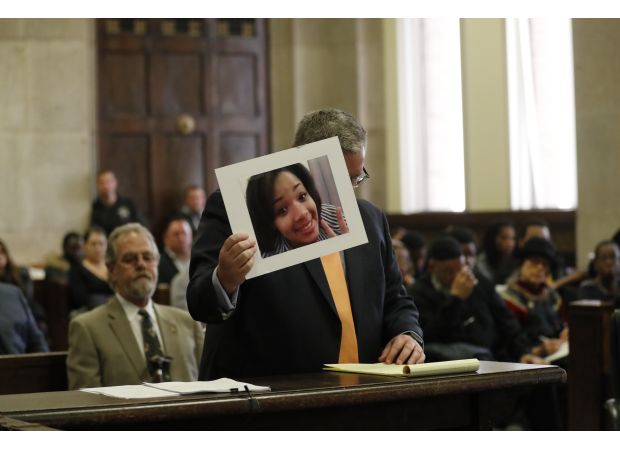Illinois Supreme Court dismisses appeal, convictions in Hadiya Pendleton murder to remain overturned.
Illinois appeals court upholds decision to overturn convictions in 2013 shooting of Hadiya Pendleton; state's highest court dismisses appeal due to division among justices.

In a recent development, the Illinois appeals court's decision to overturn the convictions of a man accused of fatally shooting 15-year-old Hadiya Pendleton in 2013 will remain in effect. This decision was made after the state's highest court discovered that there was a division among its justices on the matter, leading to the dismissal of the appeal.
The tragic incident occurred when Pendleton, a young girl with a promising future, was spending time with friends and was hit by a bullet meant for someone else. This unfortunate event took place shortly after she had performed at then-President Barack Obama's second inauguration. The incident gained widespread attention and shed light on Chicago's ongoing issues with guns and gang violence.
The Cook County state's attorney's office had attempted to salvage the case by appealing to the Illinois Supreme Court after a lower court found that detectives had continued to question the suspect, Micheail Ward, even after he had invoked his right to remain silent. However, with the Supreme Court's recent order on Thursday, it is likely that Ward will have to face a new trial as he is still charged with murder in Pendleton's death.
According to the order, Justice P. Scott Neville recused himself from the case, leaving the remaining six justices divided. As the court requires at least four concurring justices to reach a decision, the appeal was ultimately dismissed.
Ward, who is now 31 years old, had been previously convicted of first-degree murder and two counts of aggravated battery after a lengthy jury trial in 2018. Pendleton, an outstanding student and majorette, was shot and killed in a North Kenwood park where she had gone to spend time with her friends after completing her final exams at King College Prep High School on January 29, 2013.
The shooting, which was believed to be gang-related and occurred in broad daylight, sparked immense grief and outrage from City Hall to the White House. In fact, questions about the teen's death were even posed to Obama and his team in the days following the incident.
During the trial, the prosecution argued that Ward and his co-defendant, Kenneth Williams, who were allegedly members of the SUWU gang, had targeted members of the rival 4-6 Terror gang at the park, their usual hangout spot. This was part of an ongoing feud that had also resulted in Williams being shot. However, their intended targets were not hit, and instead, Pendleton and two other classmates were injured.
The prosecution presented testimony from nine students of King High School who had witnessed the shooting, along with other evidence. Out of all the students who testified, only one was able to identify Ward as the shooter, and even that student had only become certain of their identification during the trial, as stated in the lower court's opinion.
The state also called in witnesses who had previously made statements to detectives, claiming that Ward had made incriminating statements to them. However, these witnesses later recanted their statements during the trial. The prosecution also presented statements that Ward had made to detectives during questioning. Despite Ward stating multiple times that he would remain silent, the detectives continued to question him after taking breaks.
In a video shown to the jury, an 18-year-old Ward can be seen crying and saying, "I didn't even want to do it. I didn't want to do that, man. I liked that girl." He went on to speak about the ongoing feud between the gangs and another homicide, saying, "That was the final straw. It was over with. ... I loved that boy, and they killed him. They shot him in the head." Ward then expressed his remorse, stating, "That hurt – it hurt me to a point where everybody had to go, but not that girl though. That girl had nothing to do with it. She was just there."
The appeals court had previously ruled that the trial judge should have dismissed the statements Ward made to the police. However, when the assistant attorney general defended the conviction to the Supreme Court, they argued that even without the confession, the prosecution had enough evidence to convince the jury to convict Ward, making the court's error insignificant.






